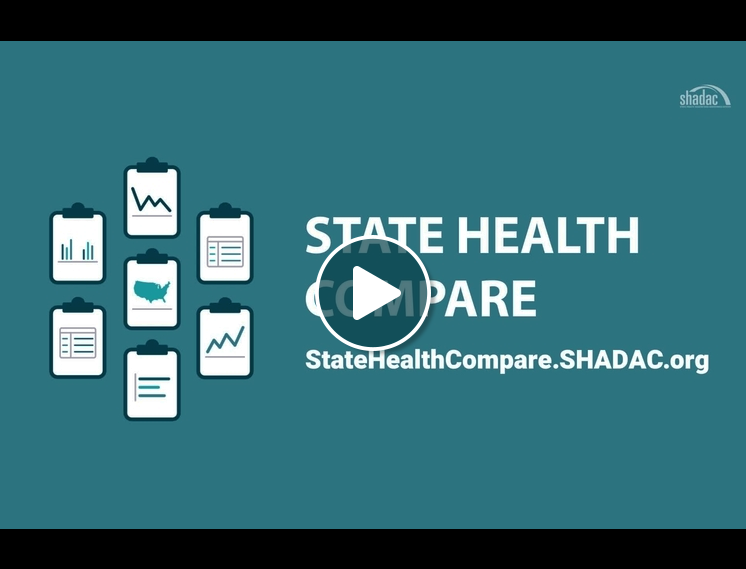SHADAC Expertise
Data Analytics and Visualization
SHADAC is a nationally recognized research center in the collection and analysis of survey data and has long maintained specific expertise in the access and use of federal data, sought after by a variety of clients. SHADAC’s State Health Compare, supported by the Robert Wood Johnson Foundation, is a user-friendly and easily accessible online data tool for obtaining state-level estimates on a range of topics related to health and health care. Additionally, SHADAC researchers are experienced in effective visualization in the form of maps, infographics, state profiles, and chartbooks, which can play a critical role in the dissemination of policy-relevant data and communication of data implications.
SHADAC's State Health Compare
 Analysts and policymakers can use State Health Compare to view measures of insurance coverage, access, cost, utilization, and outcomes—as well as social and economic measures related to health. State Health Compare allows users to compare these measures across states and look at trends over time through user-generated maps, bar charts, trend lines, and tables. Users can also explore these measures within states by characteristics (e.g., age, race/ethnicity, and education level). State Health Compare hosts more than 45 measures and estimates are available for timespans ranging from 4 to 21 years - drawing from 15 different sources. Click here for a full list of measures, data sources, and data years currently available, and check out our short tutorial video to learn tips and tricks for using State Health Compare!
Analysts and policymakers can use State Health Compare to view measures of insurance coverage, access, cost, utilization, and outcomes—as well as social and economic measures related to health. State Health Compare allows users to compare these measures across states and look at trends over time through user-generated maps, bar charts, trend lines, and tables. Users can also explore these measures within states by characteristics (e.g., age, race/ethnicity, and education level). State Health Compare hosts more than 45 measures and estimates are available for timespans ranging from 4 to 21 years - drawing from 15 different sources. Click here for a full list of measures, data sources, and data years currently available, and check out our short tutorial video to learn tips and tricks for using State Health Compare!
On-Demand Analysis of Federal Survey Data
On a task-by-task basis, SHADAC conducts quantitative analyses for the Medicaid and CHIP Payment and Access Commission (MACPAC) using a broad array of federal survey data, including the American Community Survey (ACS), National Ambulatory Medical Care Survey (NAMCS), National Electronic Health Records Survey (NEHRS), National Health Interview Survey (NHIS), National Survey of Children's Health (NSCH), National Survey on Drug Use and Health (NSDUH), Medical Expenditure Panel Survey (MEPS), Pregnancy Risk Assessment Monitoring System (PRAMS), and the Survey of Income and Program Participation (SIPP), among others. As part of this work, SHADAC assists MACPAC in scaling work to meet their information needs, producing sound estimates, and developing documentation that supports the reproducibility of results over time. Key SHADAC staff execute diverse statistical methods ranging from simple descriptive statistics and t-tests to multivariate logistic regression and maintain Special Sworn Status to facilitate access and use of restricted data at the Minnesota Census Research Data Center (MnRDC). Our work has contributed to a wide range of products, including: 2022 MACStats: Medicaid and CHIP Data Book; Experiences in Lesbian Gay Bisexual Transgender Medicaid Beneficiaries (Brief); Experiences in Accessing Care by Race and Ethnicity (Brief); June 2021 Report to Congress on Medicaid and CHIP; Health Needs of Adults Involved in the Criminal Justice System (Brief); Rural and Urban Health Care (Brief); Adolescents’ Use of Behavioral Health Services (Brief); Pregnant Women and Medicaid (Brief).
IPUMS Health Surveys (2006-Present)
Since the early 2000s, SHADAC’s Director has led an effort to harmonize the data and documentation produced by the NHIS, which was expanded in 2016 to include the MEPS. The IPUMS Health Survey project allows users to create free, individual-level customized data extracts for analysis to support time trend analysis through consistent variable coding and production of publically available microdata. This work involves the creation of more than 2,000 integrated variables with comprehensive metadata, and through this work SHADAC has developed expertise and a deep understanding of the publically available NHIS and MEPS data, supporting our work using NHIS restricted data in the RDC.
Examples of SHADAC data visualization products
50-State Snapshots and Profiles - 50-state snapshots and profiles provide an overview of individual state-level data for all 50 states and the District of Columbia on specialized topics, such as health insurance coverage or health care access and affordability. Snapshots and profiles often include not only data for the state overall, but also breakdowns by year, by demographic groups, and national or state-to-state comparison.
Room to Grow: Inequities in Children's Health Insurance Coverage
Measuring State-level Disparities in Unhealthy Days
A State-level Look at Flu Vaccination Rates among Key Population Subgroups
Infographics - SHADAC produces a wide variety of infographics as a clear and concise way to convey complex data analysis in an engaging visual format. Infographics often accompany shorter blog posts and deeper analyses, and can also stand alone as part of communication or public engagement with broader audiences.
CPS ASEC: 2020 vs. 2021: National-level Changes in Uninsurance Rates
2021 Employer-Sponsored Insurance Access and Cost in the United States
2020 NHIS: State vs. National Estimates of Health Insurance Coverage
Interactive Visualizations - SHADAC has expanded our portfolio of interactive data visualizations to provide users with an opportunity to easily and visually sort and compare data across states.
State Survey Research Activity
Selected Health Equity Activity in State Medicaid Programs
Explore more of SHADAC’s data visualization products here.
Pages
- « first
- ‹ previous
- 1
- 2
- 3




